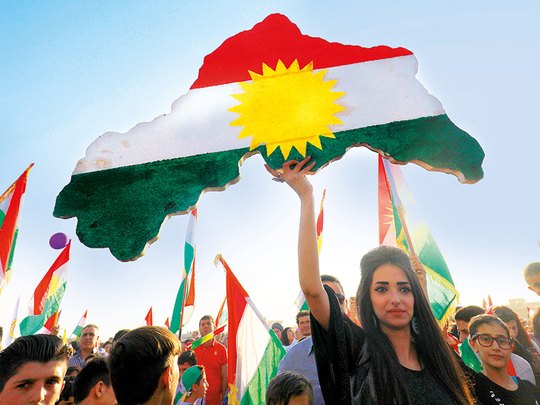
Beirut: The first Kurdish independence movement dates back to 1880, when a prominent Kurdish landowner expressed for the first time that “the Kurdish people want their affairs in their own hands” in a penned letter to a foreign diplomat.
Shaikh Obaidullah went on to say “We wish to have privileges like other nations and if that is not guaranteed, we will take matters into our own hands”.
The Kurdish people who lived in present day Turkey, Syria, Iraq and Iran were historically dwarfed and subsequently subjugated by their more powerful neighbours — the Persian Empire in the east and the Ottoman Empire to the west.
Obaidullah delivered on his promise to rise up, but unfortunately his rebellion was crushed by the Ottomans.
He was exiled to Hijaz (modern day Saudi Arabia) where he lived another three years before he died.
Ever since then, one generation after another, Kurdish leaders have emerged, championing Kurdish statehood and nationalism.
It was Sherif Pasha, a Kurdish representative and former Ottoman ambassador to Stockholm, who bravely addressed the Paris Peace Conference of 1919 advocating self-determination for the Kurdish people.
It was three years after a back room deal reached between the British and the French, carved up the Ottoman Empire who sided with the Central Powers of Germany and Austria-Hungary during the First World War and lost.
As a result, Syria and Lebanon became French protectorates while Iraq and Palestine were given to the British.
Overnight, the Kurds found themselves back to where they started. But that did not stop Sherif Pasha from marching into the Quai d’Orsay and passionately making the case for an independent Kurdish state.
Wilson’s Fourteen Points
He cited US President Woodrow Wilson’s famous Fourteen Points which set the conditions for peace after the First World War in which he promised “self-determination” for the liberated peoples of the Middle East — or “non-Turkish races” as he called them.
Wilson won over the hearts and minds of both Kurds and Arabs alike, promising them “undoubted security of life and an absolutely unmolested opportunity for autonomous development.”
Wilson added: “Every territorial settlement involved in this war must be made in the interest and for the benefit of the people concerned,” a phrase that was selected by Sherif Pasha and presented to the Great Powers in Paris.
But his plea fell on deaf ears. Not only did the Kurds not get the unified state they hoped for — they were now divided among Syria, Iraq, Iran and Turkey. In April 1920, the Kurds appealed to the Allied Supreme Council at the San Remo Conference in Italy citing the Treaty of Sevres, which carved up the former Ottoman Empire with the promise to allocate sections of Turkey to the Kurdish project.
By the time the Treaty of Lausanne was reached in 1923, all promises had been dropped at the urging of Kemal Ataturk; their basic demand of self-rule had essentially been tossed into the dustbin of history.
Current president of Iraqi Kurdistan, Masoud Barzani cited the Treaty of Lausanne, as the final nail in the coffin for a Kurdish state.
“That document reneged on a promise to carve a Kurdish state out of the remains of the Ottoman Empire and allow this non-Arab ethnic group to have its own home,” he said.
Britain abandons Kurds
Soon after Paris, Sherif Pasha quit his post and joined a secret Istanbul-based Society for the Rise of Kurdistan (Teali Cemiyeti). With the backing of a British general named Edward William Charles Noel, he attempted to organise Kurds to rise up against Ataturk.
The British abandoned him and his uprising was crushed in 1921. A handful of other rebellions were staged by the Kurds in the 1920s and 1930s, prompting Ankara to place their entire territory under martial law and to infuse it with Albanian emigrants from Kosovo and Assyrians, hoping to dilute its Kurdish identity.
The same process was repeated by the Baathists when they came to power in Iraq three decades later, when they uprooted thousands of Kurds from their homes throughout Iraq, in what was known as an “Arabisation” campaign in strategic cities like Mosul and Kirkuk.
They were all replaced with Sunni Arab Baathists from rural towns and villages.
Mosul itself was registered as 50 per cent Kurdish back in 1923, with 13 per cent Arabs and a combination of Jews, Turkmen, Assyrians, and Chaldeans accounting for 37 per cent.
The last quarter of the 20th century was marked by obstruction from Ankara, Damascus, Tehran, and Baghdad of Kurdish independence.
Over and over the Kurds were used by international heavyweights to weaken the regimes of all four countries, only to be abandoned whenever a proper settlement was reached — almost always at their expense.
In 1974, US Secretary of State Henry Kissinger encouraged Iraqi Kurds to rebel against Baghdad, hoping to drain the energy and focus of the Iraqi army. They were given money and arms, which both popped up in the Watergate investigations of 1976. The Kurds, it appeared, had been armed to dissuade Iraq from any regional adventurism but never to win. Kissinger said: “Our clients, who were encouraged to fight, were not told of this policy.”
Time will tell what the latest bid for independence has in store for the Kurds — as global pressure to abandon the referendum builds — but they hope, at least, this time will be different.












